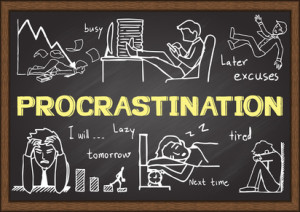Wednesday, December 23, 2015

Writers write. That’s the adage, right? But sometimes—more often than you care to admit—writers don’t write. You know it’s true. Like me, sometimes when you sit down at your computer to work (which means “write”), you don’t do anything close to producing work. You don’t type a word—except in a Facebook update, a comment on a blog post, or in an email. In other words (excuse the pun), you procrastinate instead of writing.
Why do you procrastinate? You feel afraid. You feel burned out. You feel overwhelmed. You feel stressed. You feel uninspired. You don’t want to do whatever you have to do.
You can creatively devise any number of reasons to procrastinate. If you’re honest, you’ll admit they are just excuses.
Although many people compliment me on my productivity, I fight against procrastination daily. Typically, the desire to procrastination shows up when I have to write something that makes me feel uncomfortable, or that isn’t inspiring. I also fight against starting to work when I feel any degree of fear or lack of self-confidence.
Surprisingly, when I feel overwhelmed, I also procrastinate. I know that makes no sense, but the stress makes me less inclined to dig into my work, even though doing so will relieve the stress and overwhelm.
In the end, I’m just making excuses for not writing—for not doing what I say I want to do. I’m not writing.
So, how do you become a writer rather than a procrastinator? Here are some strategies I use more often than I care to admit.
1. Just dive in.
This one is the toughest, so I’ve listed it first. When you find that you’ve spent the last three hours looking at things on Pinterest, scrolling through Facebook, and reading random blog posts—oh, and checking your inbox incessantly, just say, “Stop!” Then, say, “Start!” And do just that. Close all those windows. Turn of the sound your mail server makes when an email arrives, and just begin working. Once you start, the words will begin to flow.
2. Stop the pattern.
Get up from your desk, and move! Similar to the first strategy, this one helps you change the energy in your body, so you feel energized and excited to start writing. When you find yourself procrastinating instead of writing, stand up, get a glass of water, exercise, take deep breaths, do some tai chi or yoga moves, jump up and down, or dance. Then come back to your desk and clap your hands five times as you say, “I’m ready! I’m ready! I’m ready! I’m ready! I’m ready!” Sit down and start typing. The idea is to get your blood circulating and to send some oxygen to your brain. Not only that, cue your mind that it is time to work.
3. Give yourself a deadline.
If you don’t already have a deadline, set one for yourself. If you do have a deadline and you still aren’t writing, implement short deadlines. For example, set a timer for 30 or 50 minutes. Then write as fast as you can (no research on the Internet allowed). You might give yourself a word-count goal, such as 500 words in 30 minutes or 750 words in 50 minutes. Then hit that time, and start. You will complete a bit of writing and hopefully get in the flow.
I do some of my most efficient writing—and best writing—when I have to finish quickly. That timer or deadline—or knowing my family is coming home, or it’s almost time for dinner—gets me motivated every time.
4. Discover your why.
If you aren’t aligned with the reason you need or say you want to write your manuscript, then you won’t want to write. You’ll feel distracted, unmotivated, and uninterested. It’s important, therefore, to ask yourself what you will achieve by finishing your work. What’s your payoff?
Then ask yourself this: What do I achieve if I don’t finish the work? You might be surprised at your answer. You might get to avoid acceptance or rejection, for example. It’s important to know what procrastination helps you avoid. Discover that, and you can work on that issue, which will help you get down to the writing you say you want to do.
5. Change your location.
Sometimes what you need is a change. Take your laptop to a local coffee shop, your living room, the deck or patio, a bench near a lake or the ocean, or the library instead of working in your office. Choose a goal—for example, a word count to complete—for your time working at that location. Don’t allow yourself to leave until you finish. Eventually, you’ll put your procrastination on hold and get down to work.
I typically get a lot more done in a coffee shop, especially if I sit at one of those long tables with other people who are working. Their focused energy helps me focus. Their productivity helps me get down to work. Plus, I hate the hard chairs, and I usually want to complete my writing quickly so I can get home.

If none of these methods work for you, here’s a bonus tip:
Make a list of all the ways in which you procrastinate when you don’t want to write. Do you snack, check your text messages, look at Facebook, paint your nails, or read a book?
Now, remove them from your home and office.
I realize you can’t remove your Internet connection—a good reason to go work somewhere that offers no way to connect—but you can turn it off. And you can allow your answering machine to pick up calls, and turn off all notifications on your computer.
Try programs like
Anti-Social and
Cold Turkey to help yourself write without on-line distractions. Or give apps like
WriteRoom or
Darkroom a whirl if you want an online writing sanctuary. If you like to write in coffee shops but find yourself talking to your neighbor or watching people instead of writing, try
coffitivity.com to provide the ambient sounds of chatter and coffee drinking right in your office, where there are fewer distractions. For more distraction-free-writing suggestions,
read this post from Joel Friedlander at TheBookDesigner.com.
Here’s the bottom line. If you want or need to write, then write. Procrastination is just an excuse not to work—and not to produce written work. Give what you are doing any name you like. Any way you look at it, you are avoiding the task you say you want to accomplish—writing.
Remind yourself that if you don’t write, you’ll never be a writer. Then start writing. Tell yourself, “I will write nonfiction NOW!” Then do it.
Do you need help starting your book or becoming a successful author? Contact me for
Author Coaching before the end of December! New clients receive
15% off all coaching packages, including
Blog and Blog-to-Book Coaching and
High Performance Coaching.
Photo by
bimbim|Fotolia.com
The post
5 Ways Procrastinators Can Become Writers appeared first on
Write Nonfiction NOW!.
Nina Amir, the bestselling author of How to Blog a Book and The Author Training Manual, is a speaker, a blogger, and an author, book, blog-to-book, and high-performance coach. Known as the Inspiration to Creation Coach, she helps creative people combine their passion and purpose so they move from idea to inspired action and positively and meaningfully impact the world as writers, bloggers, authorpreneurs, and blogpreneurs. Some of Nina’s clients have sold 300,000+ copies of their books, landed deals with major publishing houses and created thriving businesses around their books. She is the founder of National Nonfiction Writing Month, National Book Blogging Month, and the Nonfiction Writers’ University. As a hybrid author she has published 15 books and had as many as four books on the Amazon Top 100 list at the same time.